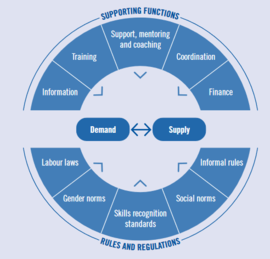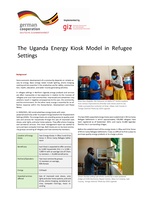Market-based Approach for Energy Access in Humanitarian Settings
A Guide to Market-Based Livelihood Interventions for Refugees
This guide provides a framework for assessment to help practitioners determine the right combination of market-based interventions that is adopted to the local context and settings.
It orients itself around the ILO's market system framework that focuses on four components of market:
- Demand and Supply
- Supporting Function
- Rules and Regulations
Involving the private sector
The following webinars discuss the approach, challenges as well as of different opportunities for involving the private sector in humanitarian context:
- Making Markets Work | Models for Private Sector Engagement in Humanitarian Energy
- Webinar on Sustainable Energy for Small Businesses in Displacement Settings
- Webinar on How to Insure Long-term Activities in Short-term Funding: This webinar provides an overview on how existing fossil fuel powered infrastructure could be replaced through a third-party delivery model and highlights the role of a Guarantee Mechanism in Humanitarian Energy Contracts through examples of interventions.
Blended Finance for the Private sector
"Blended finance is defined as an approach for increasing the amount of project funding by combining different types of financing from different sources and/or for different purposes, which contribute to development, social, environmental or humanitarian goals and generate financial returns. It is common for one source of funding within the blended finance solution to act as a catalyst for raising additional funds."[1]
Toolkits
- Blended Finance Toolkit for Clean Energy Solutions in Humanitarian and Displacement Settings
- Blended Finance Solutions for Clean Energy in Humanitarian and Displacement Settings: Lessons Learnt – An Initial Overview
Guarantee mechanisms for private sector
- Identification And Analysis Of Standard Clauses Of PPA And Leasing Agreements For Energy Provision In The Humanitarian Sector
- Feasibility and Applicability of a Global Guarantee Mechanism in Humanitarian Energy Contracts
Webinar on Delivery model for clean cooking
- Presentation on Different Delivery Models
- Publication: Funding and Delivery Models for Modern Energy Cooking Services in Displacement Settings: A Review
- Publication: Innovative Financing for Humanitarian Energy Interventions
Case Studies from the Ground
Promoting Market Based Energy Access for Cooking and Lighting in Kakuma Refugee Camp
The Market-Based Energy Access (MBEA) project was designed to drive a shift from a humanitarian, donation-based approach to market-based energy access for refugees in Kakuma refugee camp, Kalobeyei integrated settlement, and the surrounding host community. SNV implemented the pilot phase of the project between October 2017 and September 2019 with funding from the Energising Development (EnDev) programme. MBEA II launched in October 2019.
Solar-powered Energy Kiosks in Uganda
Renewable Energy for Refugees (RE4R)- Rwanda, Jordan
Publication - Humanitarian Energy : Energy for micro-enterprises in displacement settings
This publication includes 8 case studies on market-based interventions namely:
- Market-based Energy Access Project, Kakuma Refugee camp, Kenya
- Accessing Markets through Private Enterprises for Refugees’Energy access (AMPERE): Uganda
- Market-based Energy Access in Refugee Settlements and Host Communities via solar-powered energy kiosks in Uganda
- Renewable Energy for Refugees (RE4R)- Rwanda, Jordan
- Safe Access to Fuel & Energy (SAFE) project in Uganda: Building community resilience through the marketing of energy efficient products
- Borno MAIDA Project: Support for Response,Recovery and Resilience in Borno State, Nigeria
- The Moving Energy Initiative – Kenya, Burkina Faso and Jordan
- Decentralised solar-powered refrigeration solutions for micro entrepreneurs in India
Publication - Assessment of Market-Driven Solutions for Energy Access in Refugee Settlements in Sub-Saharan Africa
This report summarizes findings from 13 projects that target increasing energy access in refugee camps and settlements in sub-Saharan Africa, achieved through partnerships between humanitarian organizations and public or private sector suppliers. For each project, it analyses what worked, what did not work and their long-term sustainability.
The projects include:
- De-Risking Pay-As-You-Go Solar Home Systems in Uganda Refugee Settlements Project
- Moving Energy Initiative/Bboxx Pilot -Supporting a Solar Retailer to Test the Market in a Displacement Setting
- Solar Powered ICT and Learning Hub for Kakuma
- Renewable Energy for Refugees (RE4R)
- Installing Solar Systems in Healthcare Clinics Run by IRC
- Accessing Markets through Private Enterprises for Refugees’Energy access (AMPERE)
- Access to Energy for Refugees and Host Communities II
- Market based Energy Access (MBEA) I and (MBEA) II
- Digital Agents for Energy+
- Sustainable Use of Natural Resources and Energy in the Refugee Context in Uganda
- Building a market system for clean energy in Burkina Faso
- Remote-Controlled Solar Systems for Businesses in Rwamwanja Refugee Settlement
Further Readings
- ↑ Blended Finance Solutions for Clean Energy in Humanitarian and Displacement Settings: https://www.nrc.no/globalassets/pdf/reports/blended-finance-solutions-for-clean-energy/blended-finance-solutions-for-clean-energy-in-humanitarian-and-displacement-settings.pdf





















